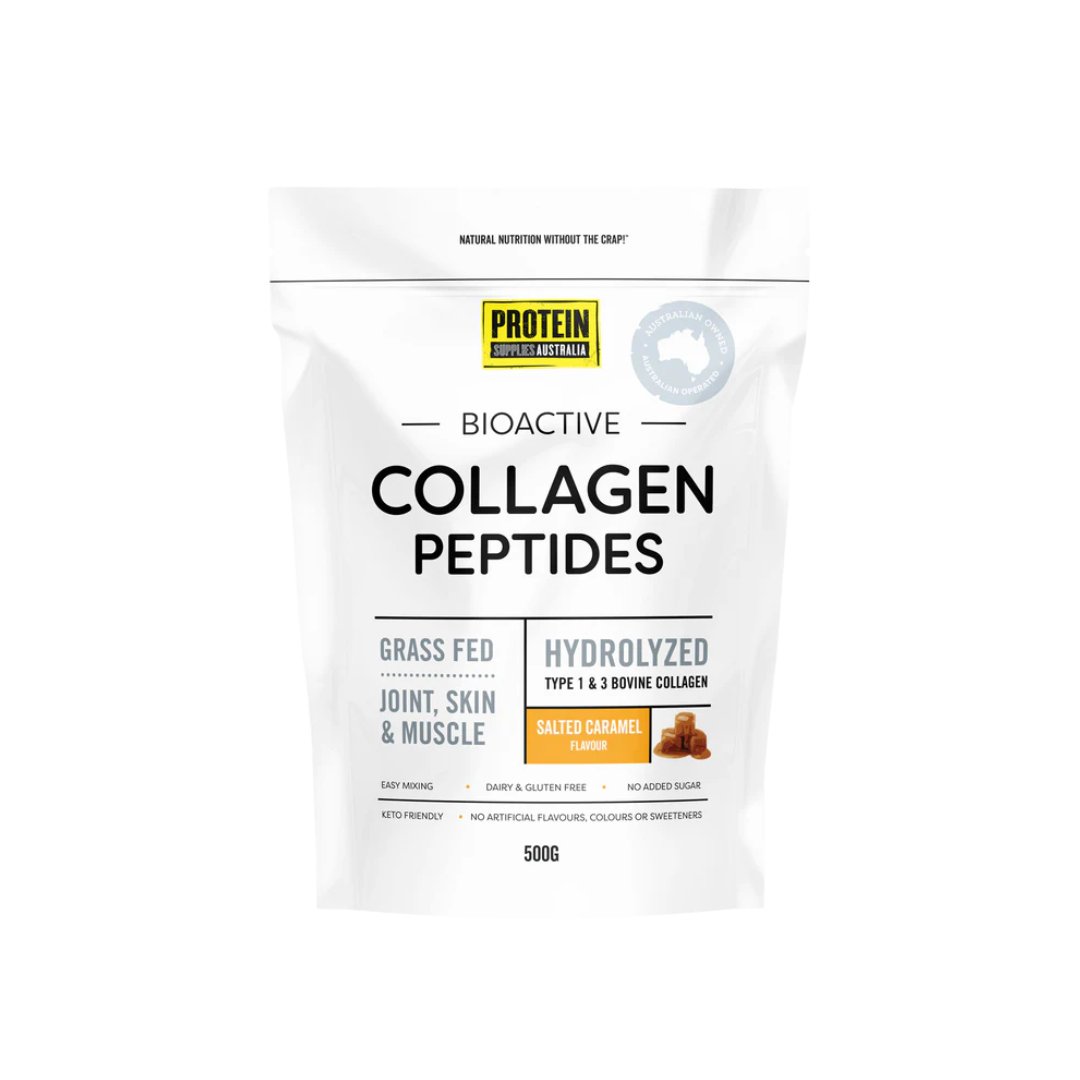Collagen is a powerhouse protein found naturally in the body, playing a critical role in maintaining the strength and elasticity of connective tissues such as skin, tendons, cartilage, and bones. As we age, our body’s collagen production begins to decline, contributing to signs of ageing like wrinkles, joint pain, and bone loss.
Fortunately, collagen peptide supplementation has emerged as a popular solution to slow down these age-related changes and support overall health. Whether you’re sipping collagen drinks, adding collagen powder to smoothies, taking a collagen supplement in capsule or liquid form, or simply eating collagen rich foods, there are many ways to enhance healthy collagen production.
In this guide, we’ll explore everything you need to know about collagen peptide benefits, how they work, and how you can include them in your daily routine.
What Is Collagen?
Collagen is the most abundant protein in the human body. It acts as a structural protein, giving strength and elasticity to various tissues, including skin, bones, ligaments, blood vessels, and muscles.
It also plays an essential role in wound healing and maintaining body composition. Hydrolyzed collagen is a form of collagen that has been broken down for easier absorption.
The Different Types of Collagen
There are at least 16 different types of collagen in the body, but the most common are:
-
Type I Collagen: Found in skin, tendons, bones, and ligaments.
-
Type II Collagen: Present in cartilage, helping cushion joints.
-
Type III Collagen: Found in arteries, muscles, and organs.
-
Undenatured Type II Collagen: Often found in collagen supplements aimed at joint support.
What Are Collagen Peptides?
Collagen peptides, or hydrolysed collagen, are broken-down forms of collagen that are easier for the body to absorb. During hydrolysis, the collagen’s protein chains are broken into smaller amino acids—especially glycine, proline, and hydroxyproline—which are vital for collagen synthesis.
You’ll find collagen peptide supplements in various forms, including:
-
Collagen powders you can add to food and drinks
-
Collagen drinks ready for on-the-go consumption
-
Capsules and tablets as part of dietary supplements
5 Collagen Peptide Benefits Backed by Science
1. Improves Skin Health and Slows Skin Ageing
One of the most celebrated benefits of collagen is its ability to enhance skin health. Collagen keeps skin hydrated, firm, and elastic, reducing fine lines and wrinkles caused by collagen degradation over time.
A systematic review of 19 studies found that oral collagen supplements significantly improved skin elasticity, skin hydration, and the overall appearance of healthy skin.
These collagen products stimulate your body’s natural collagen production, encouraging the growth of new skin cells and reducing the breakdown of existing collagen due to excessive sun exposure and environmental factors.
2. Reduces Joint Pain and Supports Joint Function
Collagen is a crucial component of joint cartilage, providing cushioning and support for smooth joint movement. As existing collagen breaks down with age, joints can become stiff and painful.
Research shows that collagen peptide supplementation can reduce joint pain and improve joint function, particularly in people suffering from osteoarthritis. One study demonstrated that athletes taking collagen hydrolysate reported reduced joint discomfort during activity.
3. Promotes Bone Health and Prevents Bone Loss
Our bones are largely made of collagen, which gives them structure and strength. As collagen diminishes with age, low bone mineral density can lead to conditions like osteoporosis.
In a year-long study, postmenopausal women taking collagen supplements alongside calcium and vitamin D saw significant increases in bone mineral density compared to those not taking collagen. This suggests that collagen peptide supplementation can slow bone loss and support overall bone health.
4. Increases Muscle Mass and Enhances Body Composition
Collagen isn’t just about skin hair and joints—it also plays an important role in muscle health. Studies indicate that collagen supplementation can increase muscle mass and improve body composition, especially in older adults with sarcopenia (age-related muscle loss).
When combined with resistance training, collagen peptide supplements enhance muscle growth by providing the essential amino acids glycine and proline, which are building blocks for muscle tissue.
5. Supports Heart and Blood Vessel Health
Collagen provides structure to blood vessels, and without it, arteries may become less flexible, increasing the risk of cardiovascular issues.
Research suggests that collagen supplementation can reduce arterial stiffness and improve HDL cholesterol levels, lowering the risk of atherosclerosis and heart disease.
Who Should Take Collagen Supplements?
Collagen supplements can be a game-changer for a variety of individuals, each benefiting in unique ways:
-
Athletes and Fitness Enthusiasts: They help improve joint health, reduce muscle soreness, and support faster muscle recovery, making them a staple in many athletes’ routines.
-
Individuals with Joint Pain or Osteoarthritis: If you suffer from joint pain or osteoarthritis, collagen supplements may offer relief. They can help alleviate joint pain and improve joint function, making daily activities more comfortable.
-
Those with Skin Concerns: Collagen is a key player in maintaining skin health. Supplements can enhance skin hydration, boost elasticity, and reduce the appearance of fine lines and wrinkles, giving your skin a youthful glow.
-
Individuals with Digestive Issues: Collagen supplements can also support gut health. They may help improve the integrity of the gut lining and reduce inflammation, which is beneficial for those with digestive issues.
-
Vegetarians and Vegans: While traditional collagen supplements are animal-derived, there are plant-based alternatives that provide essential amino acids and support collagen production, catering to those with dietary restrictions.
-
Pregnant or Breastfeeding Women: During pregnancy and breastfeeding, collagen supplements can support skin and joint health. However, it’s crucial to consult with a healthcare professional before starting any new supplement regimen.
-
Individuals with a Family History of Osteoporosis: For those at risk of osteoporosis, collagen supplements can be a proactive measure. They help support bone health and may reduce the risk of developing osteoporosis.
Collagen Rich Foods: Natural Sources of Collagen
While collagen peptide supplements are effective, you can also support your collagen synthesis naturally by consuming collagen rich foods, such as:
-
Bone broth (made from simmering bones and connective tissues)
-
Chicken skin
-
Pork skin
-
Beef
-
Fish, especially the skin
Why Vitamin C Matters
To produce collagen naturally, your body needs vitamin C, which is crucial for the process of collagen synthesis. Be sure to include plenty of citrus fruits, berries, broccoli, and other vitamin C-rich foods in your diet to maximise healthy collagen production.
Popular Collagen Products: How to Choose
There’s a growing range of collagen products on the market, from collagen powders to collagen drinks. Here’s how to choose the right product for your needs:
Collagen Powders
Versatile and easy to mix into smoothies, coffee, or yoghurt, collagen powder is a popular choice for people looking to boost their collagen intake on a daily basis.
Collagen Drinks
Convenient and pre-mixed, collagen drinks are perfect for those on-the-go. Many also include added vitamin C, hyaluronic acid, or other skin-friendly nutrients to further support hydrated skin and skin moisture.
Capsules and Tablets
For simplicity and precision in dosing, oral collagen supplements in capsule or tablet form are an easy way to incorporate collagen peptide supplementation into your routine.
How Much Collagen Should You Take?
Research indicates that a daily intake of 2.5 to 15 grams of collagen peptides is effective for improving skin health, joint pain, bone health, and muscle mass. Some studies suggest a minimum of 8 weeks of consistent use to see noticeable health benefits, particularly in skin elasticity and hydration.
Potential Side Effects and Considerations
Generally, collagen supplements are considered safe with few reported side effects. However, here are some things to keep in mind:
-
If you have allergies to fish, shellfish, or eggs, check the source of the animal collagen in your supplements.
-
Some people report mild digestive symptoms like nausea, bloating, or heartburn.
-
If you are prone to kidney stones, consult your doctor before starting collagen supplements, as the hydroxyproline content can increase oxalate production.
Interactions with Medications and Other Supplements
While collagen supplements are generally safe, they can interact with certain medications and other supplements. Here are some important considerations:
-
Blood Thinners: If you’re on blood thinners, be cautious. Collagen supplements may increase the risk of bleeding, so it’s essential to consult your healthcare provider before starting them.
-
Diabetes Medications: Collagen supplements can affect blood sugar levels. If you have diabetes, monitor your blood sugar closely and discuss any changes with your healthcare professional.
-
Thyroid Medications: There may be interactions between collagen supplements and thyroid medications. If you have a thyroid condition, it’s important to consult with your healthcare provider to ensure safe use.
-
Other Protein Supplements: Combining collagen supplements with other protein supplements, like whey or casein, requires careful consideration. Consult with a healthcare professional to ensure you’re using them safely and effectively.
-
Vitamin C Supplements: Vitamin C is crucial for collagen production. While taking collagen supplements, ensure you’re also getting enough vitamin C, either through diet or supplements, to maximize the benefits.
Are There Vegan Alternatives to Collagen?
Traditional collagen peptide supplements are derived from animal sources, but new vegan collagen products are emerging. These are typically made from genetically modified yeast and bacteria and are designed to mimic the effects of collagen peptides.
In addition to these products, a healthy diet rich in protein rich foods, antioxidants, and vitamin C can help your body make collagen naturally, without the need for animal-derived supplements.
Collagen Peptide Supplementation and Muscle Recovery
Collagen peptide supplementation can be a powerful tool for muscle recovery, offering several key benefits:
-
Reducing Muscle Soreness: After intense workouts, collagen peptides can help reduce muscle soreness, allowing for quicker recovery and less downtime between training sessions.
-
Improving Muscle Protein Synthesis: Collagen peptides support muscle protein synthesis, which is essential for muscle growth and repair. This makes them a valuable addition to any fitness regimen.
-
Supporting Connective Tissue Health: Healthy connective tissues are crucial for joint health and injury prevention. Collagen peptides help maintain the integrity of connective tissues, reducing the risk of injuries.
-
Enhancing Athletic Performance: By improving muscle recovery, reducing soreness, and supporting connective tissue health, collagen peptides can enhance overall athletic performance.
When choosing a collagen peptide supplement for muscle recovery, consider the following:
-
High Concentration of Collagen Peptides: Look for supplements with a high concentration of collagen peptides (around 10-30 grams per serving) for maximum effectiveness.
-
Added Nutrients: Supplements with added nutrients, such as vitamin C, can further support collagen production and muscle recovery.
-
Delayed-Release Formula: A delayed-release formula can provide a sustained release of collagen peptides, supporting muscle recovery over a longer period.
By incorporating collagen peptide supplements into your routine, you can support muscle recovery, enhance performance, and maintain overall joint and connective tissue health.
The Bottom Line: Why Collagen Peptides Are Worth It
The benefits of collagen peptide supplementation are well-documented. From improving skin elasticity and reducing joint pain, to supporting bone health and muscle mass, collagen can play a pivotal role in maintaining your body’s overall vitality.
By combining collagen rich foods with collagen peptide supplements, and ensuring you’re consuming enough vitamin C for optimal collagen synthesis, you can effectively support your body’s healthy collagen production.
Whether you choose collagen drinks, collagen powders, or traditional oral collagen supplements, there’s a solution that can fit seamlessly into your daily routine.






BCAA Benefits: Why Branched Chain Amino Acids Aid Muscle Recovery?
Is Whey Powder Gluten-Free?